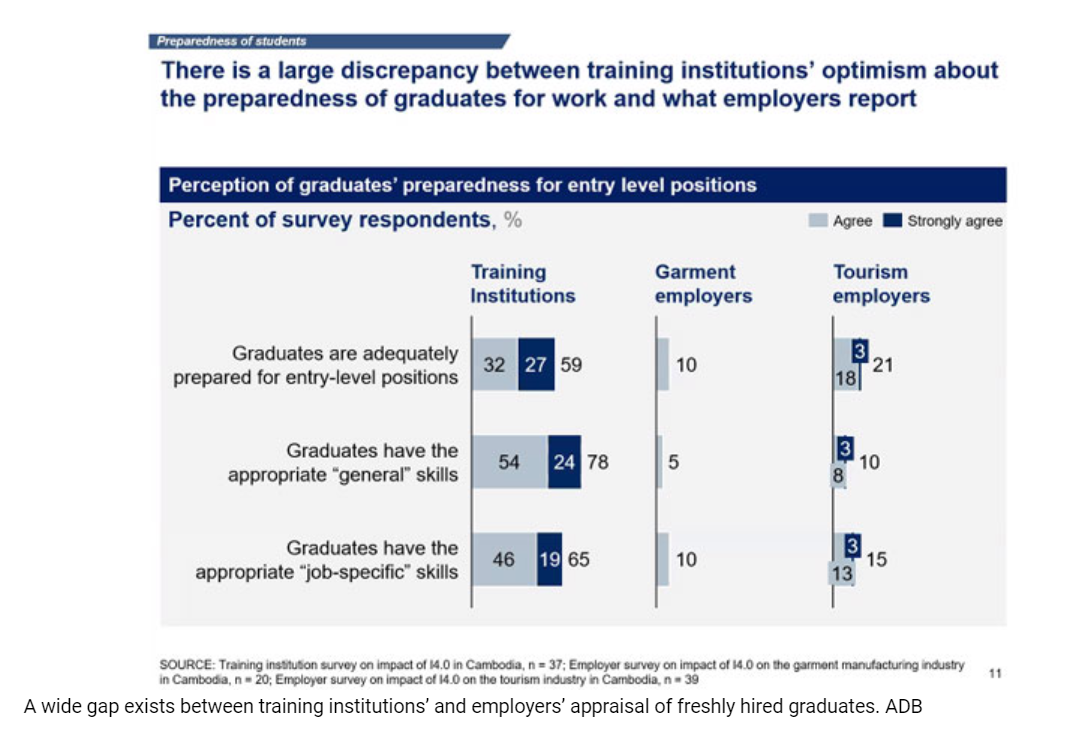Cambodia – ADB: Upskilling needed to reap benefits of Fourth Industrial Revolution
Glaring gaps exist in skills development of the Cambodian workforce as the Fourth Industrial Revolution (IR 4.0) threatens to disrupt the garment and tourism sectors, according to a study conducted by the Asian Development Bank (ADB).
ADB hosted a webinar on the comprehensive study yesterday and discussed its key findings with members of the government.
The study was conducted in 2019 and includes surveys of employers and training institutions on their readiness for IR 4.0 and analyses of data from online job portals.
One uplifting finding was that although IR 4.0 will displace workers at first, over the longer term it is predicted to create a net gain in employment in both the garment and tourism sectors from productivity increases.
According to ADB’s model, 12 percent of garment workers are facing displacement between 2018 and 2030 before increased productivity boosts jobs by 51 percent, creating a net gain of 40 percent.
In the tourism industry, 3 percent of jobs are predicted to be lost before IR 4.0 causes a 5 percent gain, resulting in a net gain of 2 percent by 2030.
“There’s going to have to be a massive shift from routine physical tasks to more analytical, interpersonal and non-routine physical tasks,” said Fraser Thompson, the director of strategic economics consultancy firm AlphaBeta – who partnered on the study.
Thompson noted that women are predicted to be far more affected than men.
“Women are likely to be five times more affected than men in terms of automation risk [jobs made redundant by technology] and that’s just because of the types of jobs that are held by women in many of these sectors,” he said.
The study noted that this effect is not as dramatic in the tourism sector, where women are predicted to be affected twice as much as men.
Another issue highlighted in the study is the lack of understanding related to IR 4.0, something that is being addressed by improving training institutes and updating curriculums.
The study found that fewer than a third of employers in the garment industry have a good understanding of IR 4.0, just under the 35 percent of employers in the tourism industry familiar with it.
Fraser said IR 4.0 is now understood as “a fusing of different technologies coming across IOT [the Internet of Things], artificial intelligence, cloud computing, cognitive computing, all coming together to transform the way we produce and interact.”
The government and ADB have made efforts to train employees in skills that will become necessary to take advantage of new jobs created by IR 4.0.
The Skills Development Fund initiated by the Ministry of Economy and Finance is one such project. It aims to assist businesses who take the initiative to implement training programmes.
Cambodia’s Technical and Vocational Education and Training (TVET) Policy 2017–2025 likewise seeks to address deficiencies in skills development knowledge by broadly promoting understanding of it, fostering public-private partnerships and formulating plans and strategies to address the issue.
According to ADB’s study, Cambodia’s current training institutes are not producing acceptable results for employers.
When asked if graduates of the training institutes possessed appropriate general skills, 78 percent of the institutes said they did. When garment employers were posed the same question, 5 percent agreed. In the tourism sector, 10 percent of employers agreed.
Similar results were recorded regarding the preparedness of graduates for entry-level positions and whether they had appropriate job-specific skills after graduating.
Chea Kok Hong, the director of the Macroeconomic and Fiscal Policy Department at the Ministry of Economy and Finance, said it is difficult for the government to implement cost-sharing measures because of different procedural difficulties and that managing training programmes was also hindered by the fact that the government had little experience in the matter and the private sector has even less.
He said there was an opportunity for the government to invest in state-owned training infrastructure that could then be managed by the private sector.
“There is a window of opportunity for the modality to work. The government can finance infrastructure and own it. This is somewhere the government can invest and then allow the private sector to manage and invest in the training,” he said.
Hong also noted that more than 70 percent of students in Cambodia drop out before grade 9 to join the labour market and therefore, it was a priority to improve curriculums in grade 8 and 9.
“I think one of the priority areas is for us to invest at [the] grade 8 and 9 [level], in terms of basic industry knowledge and IR 4.0 [knowledge],” he said.
Genevieve Lim, an AlphaBeta engagement manager, said that although the study found that the government has increased investment in education and TVET, there were still weaknesses when it came to incentivising skills development.
Lim said from an industry perspective employers don’t have the incentive to train workers because of the risk that they will be lured by another company after receiving training.
She said primary and secondary students aren’t incentivised because “wage premiums don’t change very much from one level to another”.
Higher education institutions are similarly not incentivised because a main revenue source for them is student fees and because of this, they tend to cater to students’ desires over more forward-thinking priorities.
“This has led to a concentration of students in generalist disciplines such as business administration and social sciences,” she said.
Hul Seingheng, the director-general of the General Department of Science, Technology and Innovation, said a roadmap to deal with the challenges and benefits of IR 4.0 has been created and the current goal is creating synergy between different ministries and stakeholders.
He said a main target is still for Cambodia to become a high-income country by 2050. Part of this goal, he said, is having 50 percent of students involved with science, technology, engineering and mathematics by 2030.
Source: https://www.khmertimeskh.com/50836285/adb-upskilling-needed-to-reap-benefits-of-fourth-industrial-revolution/


 English
English




